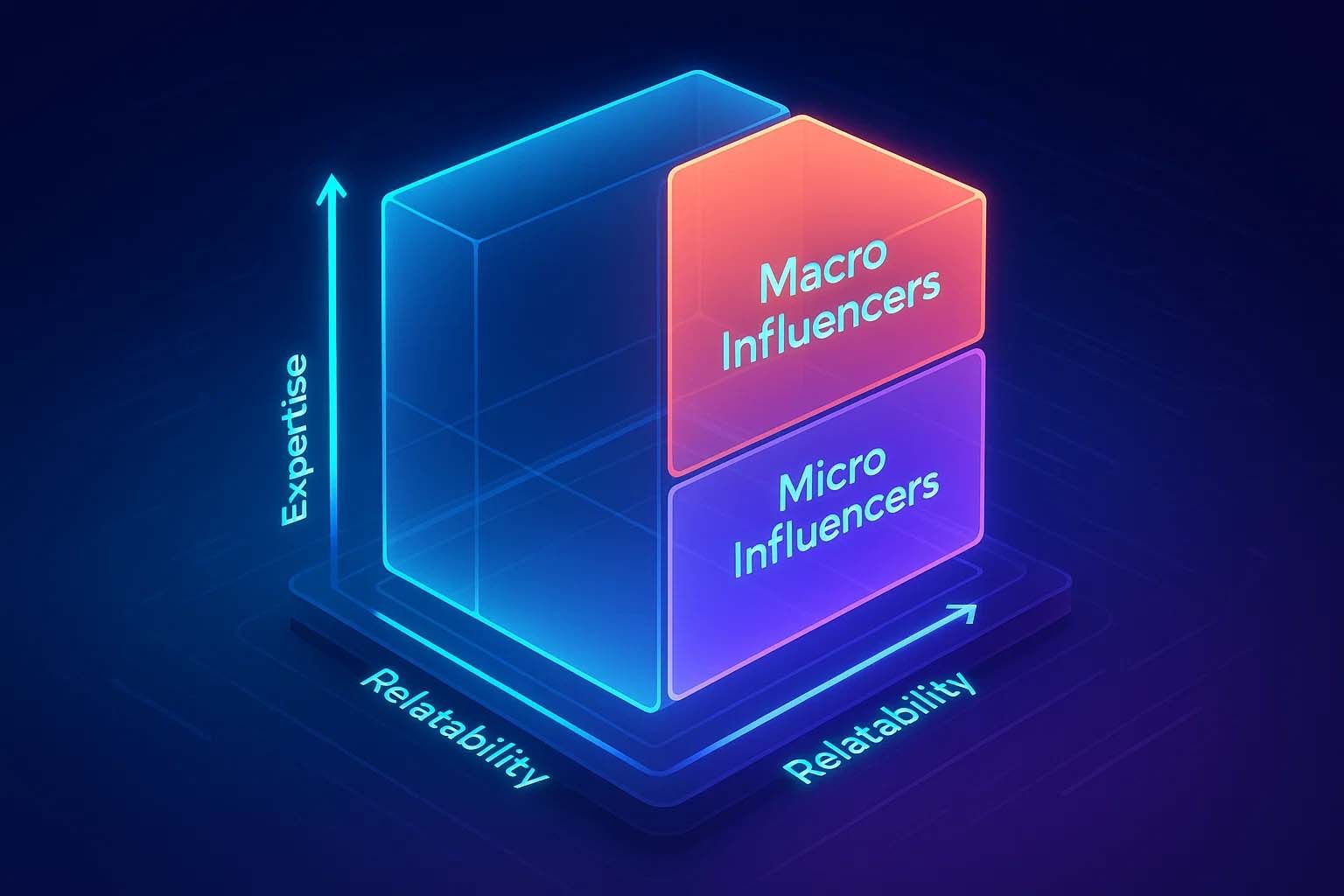Psychology Behind Influencer Marketing: Why People Trust Influencers

Understanding the psychology behind influencer marketing has become crucial for brands seeking authentic consumer connections. Unlike traditional advertising, successful influencer marketing campaigns leverage fundamental psychological principles that naturally guide purchase decisions.
The secret isn't follower counts or flashy promotions – it's the deep-rooted human tendencies toward trust, social validation, and emotional connection that make people buy from relatable figures they perceive as authentic.
Main Takeaway – The Psychology of Influencer Marketing
The success of influencer marketing campaigns stems from their ability to harness fundamental psychological principles that govern human behavior. Unlike traditional marketing approaches that often feel intrusive or sales-focused, effective influencer marketing works because it mimics natural social interactions and trusted relationships.
People are influenced by credibility, authenticity, and social validation more than by direct advertising messages. The psychology behind influencer marketing taps into our innate need for social connection and guidance from perceived authority figures who feel accessible and relatable. When influencers build trust through consistent, honest communication, their followers develop genuine emotional bonds that significantly influence consumer behavior.
Key psychological advantages of influencer marketing include:
-
Natural social dynamics that feel organic rather than commercial
-
Peer-to-peer communication that bypasses traditional advertising resistance
-
Emotional investment in the influencer's success and recommendations
-
Community validation through visible social proof and engagement
Research consistently shows that successful influencer marketing campaigns create a psychological environment where purchase decisions feel organic rather than forced. This approach leverages the same mechanisms that drive real-world social influence, making it particularly powerful in today's social media landscape, where authenticity is highly valued.
Core Psychological Mechanisms Behind Why Influencer Marketing Works
Understanding the psychological foundations of influence reveals why certain marketing strategies resonate while others fall flat. The most effective influencer campaigns tap into multiple psychological triggers simultaneously, creating a compelling environment for consumer engagement.
Social Proof and Conformity in Influencer Marketing
Social proof operates as one of the most powerful psychological principles in influencer marketing. This concept, extensively studied by psychologist Robert Cialdini in his foundational research documented in Influence: The Psychology of Persuasion, demonstrates that people mimic the actions of others when making decisions, especially in uncertain situations. Social media influencers amplify this effect by making product endorsements visible to thousands or millions of followers simultaneously.
When followers see likes, comments, and shares on an influencer's content, these engagement metrics serve as immediate social validation signals:
-
Public engagement metrics that demonstrate community approval
-
User-generated content showing real people using recommended products
-
Comment sections filled with positive experiences and testimonials
-
Share counts indicating content value and social acceptance
The psychological phenomenon where people look to others' behavior for guidance becomes particularly potent on social media platforms, where engagement is publicly visible and quantifiable. This visible community support makes followers feel more secure making choices based on the influencer's guidance, as they can see evidence of others' positive experiences.
Building Trust and Authenticity in Influencer Marketing
Trust forms the cornerstone of effective influencer marketing, and it develops through consistent demonstration of authenticity over time. When influencers share honest experiences, acknowledge product limitations, and maintain transparency about sponsored partnerships, they establish credibility that traditional advertising struggles to achieve.

The most effective trust-building strategies include:
-
Transparent disclosure of all partnerships and sponsorships
-
Honest product reviews that include both benefits and limitations
-
Consistent brand voice that reflects genuine personality traits
-
Regular engagement with followers through authentic interactions
-
Vulnerability sharing about personal challenges and growth
Authenticity in influencer marketing isn't just about disclosure – it's about genuine communication that reflects the influencer's actual experiences and values. Research shows that followers can quickly detect insincerity, and overly scripted or purely promotional content often backfires by damaging the trust that makes influencer marketing effective.
The most successful influencers understand that building trust requires vulnerability and honesty. They share both positive and negative experiences, admit mistakes, and maintain consistent communication styles that reflect their genuine personalities. This authenticity creates psychological safety for followers, making them more receptive to product recommendations.
Parasocial Relationships and Emotional Bonds
Parasocial relationships represent one of the most fascinating aspects of influencer psychology. These one-sided emotional connections develop when followers feel personal closeness to influencers despite the lack of reciprocal interaction. Research from Current Opinion in Psychology indicates that these relationships significantly affect audiences' purchase intentions and continuance behavior, making them crucial for understanding why influencer marketing is effective.
These psychological bonds mimic real friendships in many ways, creating emotional investment that extends beyond simple product interest. The research reveals three key characteristics of influencer-follower parasocial relationships:
-
Emotional investment in the influencer's personal success and wellbeing
-
Sense of intimacy despite one-way communication
-
Perceived reciprocity where followers feel the influencer understands their needs
Followers often feel they "know" their favorite influencers personally, leading to increased trust in their recommendations and greater likelihood of supporting products they endorse.
The power of parasocial relationships lies in their ability to create emotional loyalty that transcends individual campaigns. When followers feel connected to an influencer as a person, they're more likely to support their endeavors consistently, creating sustainable influence that benefits both the influencer and partnering brands.
Source Credibility: Why the Right Influencers Matter
Source credibility encompasses multiple psychological factors that determine whether an influencer's message will be persuasive. These factors include expertise in relevant areas, perceived trustworthiness, attractiveness (both physical and social), and relatability to the audience's lifestyle and values.
The most effective influencers demonstrate clear expertise in their niche while remaining approachable and relatable. This combination creates a powerful psychological dynamic where followers view them as both knowledgeable guides and accessible peers. The impact varies significantly between micro influencers who serve specific communities and larger influencers with mass appeal.
Successful influencer partnerships require careful matching between the influencer's credibility profile and the brand's target audience. When there's strong alignment, the influencer's existing credibility transfers to the product recommendation, making followers more likely to trust and act on the suggestion.
Emotional Connection and Storytelling in Marketing Campaigns
Emotional triggers play a crucial role in purchase decisions, and skilled influencers excel at creating content that resonates on an emotional level. Through storytelling, humor, vulnerability, and shared experiences, they humanize both themselves and the products they recommend.
The psychology of influence reveals that people are more likely to buy based on emotional connection than rational analysis alone. When influencers share personal stories about how a product fits into their daily life or solves a genuine problem, they create emotional resonance that motivates action.
Effective influencer storytelling doesn't just showcase products – it demonstrates how those products enhance lifestyle, solve problems, or contribute to identity expression. This approach transforms product recommendations from sales pitches into lifestyle guidance, making them psychologically more acceptable and persuasive.
Cialdini's Principles Applied to Influencer Marketing
Robert Cialdini's six principles of persuasion – reciprocity, liking, authority, consistency, scarcity, and social proof – all operate powerfully within influencer marketing contexts. The comprehensive meta-analysis from the Journal of the Academy of Marketing Science examining 1,531 effect sizes confirms how these principles drive campaign effectiveness.
Here's how successful influencers naturally incorporate these principles:
-
Reciprocity & Liking: Providing valuable free content before promoting products • Engaging authentically with follower comments and questions • Sharing personal struggles and victories to build connection
-
Authority & Consistency: Demonstrating expertise through educational content • Maintaining consistent brand voice and values alignment • Building credibility through transparent product experiences
-
Scarcity & Social Proof: Creating limited-time exclusive offers for their community • Showcasing real follower results and testimonials • Highlighting popular products that are trending within their audience
The Psychology Behind Influencer Marketing and Consumer Behavior
Consumer behavior in the context of influencer marketing follows predictable psychological patterns that smart marketers can leverage ethically and effectively. Understanding these patterns helps explain why some campaigns drive significant results while others fail to generate meaningful engagement or conversions.

The psychological journey from initial exposure to purchase involves multiple stages where different mental processes influence decision-making. Successful influencer marketing campaigns guide consumers through this journey by addressing psychological needs at each stage, from initial awareness through trust-building to final purchase motivation.
How Social Media Influencers Shape Purchase Decisions?
Social media influencers shape purchase decisions by creating visible communities around products and lifestyle choices. When followers see their favorite influencer using a product and observe positive community response, they experience powerful psychological pressure to conform to group behavior.
The fear of missing out (FOMO) represents a particularly potent psychological trigger in influencer marketing. When influencers create urgency around limited offers or exclusive access, they tap into deep-seated anxiety about being excluded from desirable experiences or opportunities.

Effective influencers understand that their power lies not in direct selling, but in demonstrating how products integrate naturally into aspirational lifestyles. They show rather than tell, allowing followers to visualize themselves using recommended products and experiencing similar satisfaction.
Authenticity in Influencer Marketing and Its Effect on Consumer Behavior
Authenticity serves as the psychological foundation that makes all other influence techniques effective. When followers perceive an influencer as genuine, they're more willing to accept recommendations and engage with promotional content. Conversely, detected inauthenticity can instantly undermine trust and render even well-crafted campaigns ineffective.
The psychology of authenticity in marketing relates to cognitive consistency theory – people prefer when others' actions align with their stated values and personality. Influencers who maintain consistent authentic voices create psychological comfort for their audiences, making recommendations feel like natural extensions of ongoing relationships rather than commercial interruptions.
Research demonstrates that overly scripted or obviously commercialized content triggers psychological defenses that make audiences resistant to influence. The most successful influencer marketing strategies maintain the delicate balance between promotional effectiveness and authentic communication.
Emotional Storytelling and How People Are Influenced
Human psychology favors narrative over statistics when processing information and making decisions. Influencers leverage this tendency by embedding product recommendations within compelling personal stories that create emotional investment in outcomes.
Effective emotional storytelling in influencer marketing doesn't just describe product features – it demonstrates transformation, solves relatable problems, or enhances identity expression. These narratives create psychological investment that makes followers more likely to seek similar outcomes through product adoption.
The most persuasive influencer content combines rational product benefits with emotional satisfaction, addressing both logical and psychological motivations for purchase. This dual approach acknowledges the complex psychology behind consumer decision-making while providing clear paths to desired outcomes.
Why Influencer Marketing Works in Driving Successful Campaigns
The effectiveness of influencer marketing stems from its ability to combine multiple psychological advantages that traditional advertising cannot replicate. When brands understand these psychological mechanisms, they can create more effective campaigns that drive genuine engagement and sustainable results.
Meta-analysis research examining 1,531 effect sizes from 251 papers confirms that influencer marketing significantly impacts consumer behavior and decision-making, providing robust evidence for the psychological principles underlying its effectiveness.
Choosing the Right Influencers for Campaign Success
Selecting the right influencers requires understanding the psychological compatibility between influencer, audience, and brand. Success depends more on values alignment, lifestyle resonance, and audience relevance than on follower count alone. When psychological alignment exists, influence flows naturally because recommendations feel consistent with the influencer's established identity.

Misaligned partnerships create cognitive dissonance for audiences, triggering skepticism and resistance that can damage both influencer credibility and brand perception. The psychology behind successful partnerships involves finding influencers whose authentic interests and values naturally align with brand offerings.
Smart brands recognize that micro influencers often generate stronger psychological connections with their audiences than macro influencers, despite smaller reach. These deeper relationships translate into higher trust levels and more effective influence over purchase decisions.
Long-Term Partnerships and Building Trust
Sustained collaboration between brands and influencers creates powerful psychological advantages through repeated exposure and consistency. When audiences see ongoing authentic partnerships, they develop stronger trust in both the influencer's judgment and the brand's quality.
Long-term partnerships allow influencers to demonstrate genuine product experience over time, sharing both initial impressions and extended use outcomes. This transparency builds credibility that single-campaign promotions cannot achieve, as followers witness authentic long-term satisfaction with recommended products.
The psychology of repeated exposure suggests that familiar partnerships feel more trustworthy than one-off promotions. When influencers consistently recommend products they genuinely use and enjoy, their audiences develop confidence in their judgment across multiple product categories.
Potential Pitfalls Behind Influencer Marketing Work
Understanding consumer psychology also reveals common mistakes that can undermine influencer marketing effectiveness. Over-commercialization triggers psychological defenses that make audiences resistant to influence, while inconsistent endorsements create confusion about the influencer's genuine preferences.
Loss of authenticity represents the most dangerous pitfall in influencer marketing. When followers detect that an influencer is promoting products purely for financial gain rather than genuine belief, the psychological foundation of trust collapses rapidly and often permanently.
Successful brands avoid these pitfalls by prioritizing long-term relationship building over short-term conversion optimization. They understand that maintaining psychological trust requires patience and consistency rather than aggressive promotional tactics.
The Impact of Influencer Marketing on Consumer Behavior
The psychological impact of influencer marketing varies significantly across demographics, with younger consumers particularly responsive to authentic peer influence. Millennials and Gen Z consumers have grown up with social media, making them especially attuned to authenticity cues and resistant to traditional advertising approaches.

These generational differences reflect deeper psychological patterns around authority, trust, and social connection. Younger consumers prefer guidance from relatable peers over distant celebrities or corporate spokespersons, fundamentally changing how effective marketing works in the digital age.
How Influencers Use Social Proof to Drive Marketing Works?
Practical social proof mechanisms include showcasing follower testimonials, highlighting engagement metrics, and creating viral content that demonstrates community adoption. These tactics work because they provide psychological evidence that others have successfully used and enjoyed recommended products.
The power of social proof in influencer marketing extends beyond simple numbers – it creates visible communities around products and lifestyles. When followers see others engaging positively with influencer recommendations, they experience psychological pressure to participate in the community experience.
Successful influencers understand how to cultivate and showcase authentic social proof rather than manufacturing false validation. This approach builds sustainable influence that continues to drive results over time rather than creating short-term spikes followed by credibility loss.
The Power of Social Proof and Why People Trust Influencers
People trust influencers more than traditional advertisements because influencer content feels like peer recommendations rather than corporate messaging. This psychological distinction is crucial because humans are evolutionarily wired to value advice from trusted community members over messages from unknown sources.

The transparency required in influencer marketing – such as disclosure of partnerships – paradoxically increases trust rather than decreasing it. When influencers are open about their commercial relationships while maintaining authentic enthusiasm for products, followers appreciate the honesty and feel more confident in their recommendations.
Social validation through influencer endorsements provides psychological comfort that reduces the risk perception associated with trying new products. This risk reduction is particularly powerful for online purchases where traditional evaluation methods like physical inspection aren't available.
Key Insights for Brands and Marketers Using Influencer Marketing
Successful influencer marketing requires deep understanding of the psychological principles that drive consumer behavior. Brands that prioritize relationship-building and authentic communication consistently outperform those focused solely on reach metrics or immediate conversions.
The most effective marketing strategies recognize that influence develops gradually through consistent demonstration of value, authenticity, and genuine care for audience welfare. This long-term approach may require more patience but generates more sustainable results and stronger brand loyalty.
Partnering with Influencers the Right Way
Effective influencer partnerships begin with thorough research into psychological compatibility between influencer values, audience demographics, and brand identity. The goal is finding influencers whose authentic interests naturally align with brand offerings, creating opportunities for genuine enthusiasm rather than forced endorsements.
Successful partnerships provide influencers with creative freedom to present products in ways that feel natural to their content style and audience relationship. This approach leverages the existing trust and communication patterns that make the influencer effective, rather than disrupting them with overly controlling brand requirements.
Transparency remains crucial for maintaining psychological trust. Both brands and influencers must disclose sponsored content clearly while ensuring that commercial relationships don't compromise the authentic communication that makes influence possible.
What Makes Influencer Marketing Campaigns Successful?
Successful influencer marketing campaigns combine psychological understanding with strategic execution. They recognize that different types of influencers appeal to different psychological needs – some provide expertise and authority, others offer relatability and peer connection, and still others deliver entertainment and aspiration.
The most effective campaigns allow time for relationship building between influencers and audiences rather than expecting immediate conversion. They understand that psychological trust develops gradually and that rushing the process can trigger resistance that undermines campaign effectiveness.

Measurement strategies for successful campaigns extend beyond immediate sales metrics to include trust indicators, engagement quality, and long-term brand sentiment. These metrics better reflect the psychological impact that drives sustainable influence over time.
Conclusion – The Psychology Behind Why Influencer Marketing Works
The enduring success of influencer marketing lies in its alignment with fundamental psychological drivers that have governed human social behavior for millennia. Trust, social validation, emotional connection, and community influence represent basic human needs that effective influencers address through their content and relationship-building approaches.
As social media platforms continue evolving, the underlying psychology behind influencer marketing remains constant. People will always seek guidance from trusted sources, value authentic communication over corporate messaging, and respond to social proof when making decisions. Understanding these psychological foundations enables brands to create more effective, ethical, and sustainable influencer marketing strategies.
Looking ahead, the increasing sophistication of audiences means that authenticity, transparency, and genuine value creation will become even more critical for campaign success. Brands that invest in understanding consumer psychology and building authentic relationships through carefully chosen influencer partnerships will continue to see the strongest results as the industry matures.
Research Sources:
-
Influencer marketing effectiveness: A meta-analytic review - Journal of the Academy of Marketing Science
-
Parasocial relationships, social media, & well-being - Current Opinion in Psychology
01.09.2025
374 article view
Similar articles
29.08.2025
Multi-Platform Influencer Strategies: Maximizing Reach Across All Channels
The digital marketing landscape has transformed dramatically, with influencer marketing emerging as a...
23.12.2024
Complete Guide to Free YouTube Analytics Tool
YouTube Analytics transforms raw viewership data into actionable insights that can dramatically impact...
26.09.2024
Characteristics and values of Z generation
Who is Generation Z and Their Definition The term "Gen Z" describes those who were born from the late...